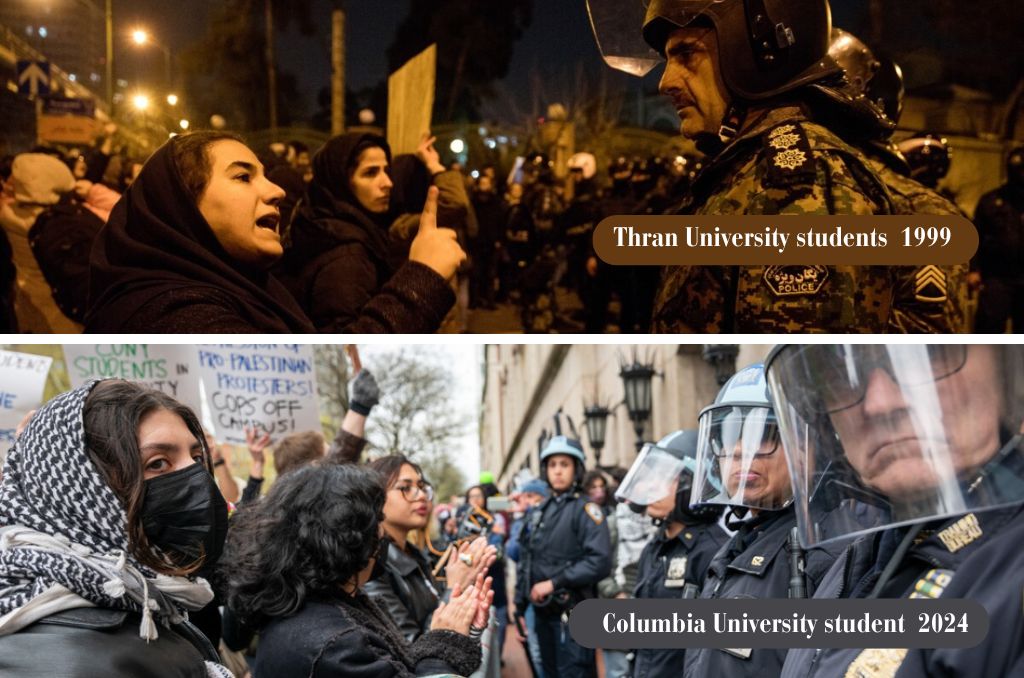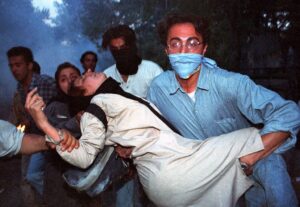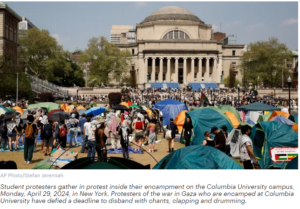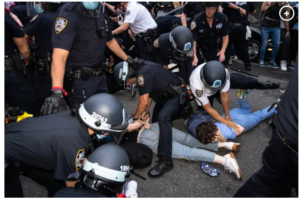
The horror of seeing Hamid coming down from the rooftop of Salam Newspaper in Tehran never left me. Before throwing him off, I saw two male figures saying “Allah Akbar” When they threw Hamid in the air.
Hamid was coming down. I saw him in the air. I didn’t wait for his fall. I turned my back and started running. I cannot even remember whether I heard the sound of his body hitting the ground. I was just running as if I held my life in my hands; as if I myself was thrown from the rooftops of Salam Newspaper.
I ran. I didn’t look back to see if anyone was following me. I didn’t stop for the red light at the intersection of the main two roads. I ran more than 12 blocks before I could stop.
When I finally stopped to catch my breath, I threw up. It was mostly water and tea. I hadn’t had much that morning. I felt as if my stomach and the intestines came out of my mouth. But there was only the watery puke.
Then, I started screaming. I screamed as loud as I could. No one was there. No one could see me, and I didn’t care if anyone did.
 All of a sudden a calm voice called my name. “Sara, is that you?” she said. I turned toward the voice and saw Fariba, one of my classmates at the main campus. “Yeah,” I screamed. “It is fucking me. They killed Hamid. The motherfuckers killed Hamid.”
All of a sudden a calm voice called my name. “Sara, is that you?” she said. I turned toward the voice and saw Fariba, one of my classmates at the main campus. “Yeah,” I screamed. “It is fucking me. They killed Hamid. The motherfuckers killed Hamid.”
I hated Hamid. He was the most religious person in the newsroom. He supported Khoeiniha’s strategy blindly. He was only 21, an intern. But they didn’t look at who they were throwing off the rooftop.
“The “Ansar” bastards killed him,” I screamed. Ansar Hizbollah, or Ansar for short, was an unofficial self-claimed paramilitary group that executed some of the orders of high-ranking Iranian officials, including threatening or killing opponents and journalists.
As I recall those moments, I remember things that I cannot explain. How can you explain feelings?
“Sara, I know you are very upset,” Fariba said. “But, we have to leave. They are looking for all the reporters at Salam Newspaper. We must leave.” Fariba knew I worked for Salam Newspaper.
She gave me a large napkin to clean up myself while she was picked up me and my knapsack. “Let us go to the campus. They don’t go there,” she said. Our campus was a female-only campus at the heart of Tehran.
As we got closer, I saw a few people that I knew belonged to the Ansar. There were also some Basijee members. Basijees acted like Ansar, only more openly as they had more support from the establishment.
We took the opposite direction and threw ourselves into a Manto shop selling fashionable Islamic robes. Fariba took me to the fitting room and demanded that I stay there until things cooled down a little.
Three days later, the country was inflamed. Students at Tehran University demanded a reason for the Salam Newspaper shutdown.
Like today’s Columbia University students, the students at Tehran University demanded a response from the establishment for their policies and orders.
Background story:

Mr. Abbas Abdi, the head of the editorial team at Salam Newspaper, decided that we publish a confidential letter written by Saeed Emami, one of the advisers at the Intelligence Services, indicating in his letter to Mr. Dori-Najafabadi, the current Secretary of Intelligence, that the establishment needs to control and interfere with the distribution of news and information in Iran.
In his letter, Emami demanded that Dori-Najafabadi put more restrictions against journalists and writers in the new draft of the press law that was going to be introduced to the parliament within a few weeks in 1998. His concern came when Salam Newspaper published a financial scandal of Mohsen Rafighdoost, the head of the Islamic Revolutionary Guard Corps, the multi-service paramilitary branch of the Iranian Armed Forces.
Earlier, Salam Newspaper was among the first papers in the country to publish the massacre of a few writers, journalists, and political opponents. The murder was later labeled as Chain Killing. Due to those activities, Salam Newspaper was shut down on July 7, 1999.
Parallels between the Iranian Student uprising and Columbia students’ encampment
 University students were the main readers of Salam Newspaper content. When the paper was banned, Tehran University students held large demonstrations at the campus on July 8th, 1999. Fearing that the protest would spill among other universities, the establishment recruited Ansar and Basijee to attack students’ dormitories at night and to arrest student leaders.
University students were the main readers of Salam Newspaper content. When the paper was banned, Tehran University students held large demonstrations at the campus on July 8th, 1999. Fearing that the protest would spill among other universities, the establishment recruited Ansar and Basijee to attack students’ dormitories at night and to arrest student leaders.
The attack went so badly. Many students were killed and injured. Later, the event was marked as a turning point in Iran’s protest and named the Kuye Daneshgah Disaster.
I see a direct parallel between the Columbia University students’ demand for Israel divestment and Tehran University students’ demand for the flow of information. Like Tehran University students, Columbia University students want accountability from their government. In what name does the U.S. Congress write a blank check to Israel, and sends missiles and weapons to kill massive numbers of Palestinians, displace millions, and injure hundreds of thousands? In what name has the U.S. administration stayed quiet against the mass killing in Gaza? Why should we spend our tax money on the atrocities of our government?
Columbia University students are demanding for Israel divestment, and Tehran University students demanded for the flow of information. They both want accountability from their government.
The background story of Columbia Students protest
Both student groups are young, they care about their countries, they see what’s happening, and they want accountability.
About two weeks ago, Columbia University students set up an encampment at the West Lawn of Morningside Campus at the same time when university president Nemat Shafik called for questioning before the congress. Shafik was heavily criticized by the Republican for not doing enough to stop anti-semitism rhetoric.
Students were angry at the congress reaction to the ongoing war in Gaza. They felt betrayed that the Congress ignored the killing and displacement of millions of Palestinians, while they were only concerned about the rhotic at the campus. They became more adamant to voice their frustration over the Israel war in Gaza.
Demands of the students
 Student protesters want their universities to sell off their investments in companies that have businesses and investments in Israel. A common mantra among protesters at universities across the country, that has spread to Canada and Europe now, is “Disclose, divest, we will not stop, we will not rest.”
Student protesters want their universities to sell off their investments in companies that have businesses and investments in Israel. A common mantra among protesters at universities across the country, that has spread to Canada and Europe now, is “Disclose, divest, we will not stop, we will not rest.”
Many students and faculty have launched marches, walkouts, and other demonstrations in solidarity with students to bring attention to 34,000 Palestinians killed, and more than three million are displaced in Israel attacks, since Hamas killed 1200 Israelis and took more than 200 hostages on October 7.
Police brutality
Law enforcement officers reportedly tore down tents of encampments at various universities across the United States. They removed, often forcefully, protesters or arrested professors and students.
Conclusion
What I cannot understand is the treatment of students in Iran compared to the treatment of students in the United States. It is predicted that Iran will kill its students because they are an authoritarian and theocratic regime. But why do we brutalize our actions against the students in the U.S. when we claim we are a democratic state supporting freedom of speech?
Please Pledge to Our Independent Peace Journalism.
Goltune is editorially independent. We set our agenda. No one edits our editors. No one steers our opinion. This is important as it enables us to stay true to our values.
Every contribution we receive from readers like you, big or small, goes directly into funding our journalism. Please support Goltune, large or small.
Send your contributions to our PayPal account: [email protected]
Or, Click the link to pledge your support.
Thank you,
Goltune Editorial Team






